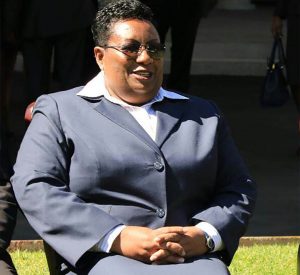

NOBUHLE Ndlovu, a mother of two who once made a living selling sculptures to tourists before the Covid-19 outbreak hit Zimbabwe in March, now arrives at an eerily empty Victoria Falls market at 5 am every day to peddle vegetables.

Zimbabwe Anti-Corruption Commission chairperson, Loice Matanda-Moyo
Before a national lockdown was imposed to contain the deadly virus, the resort town was a hive of activity as tourists from around the world visited the majestic Victoria Falls, providing business to thousands of people both in the formal and informal sector.
“My children and mother depend on the little I make from selling farm produce for survival,” said Ndlovu, 21, clutching at her worn jersey while putting on a home-made face mask. “If I don’t wake up early, I will lose my customers and we will have nothing to eat.”
Her daily struggles are not uncommon in a country facing its worst economic crisis in more than a decade amid runaway inflation, foreign currency shortages, soaring fuel and electricity prices, and a broken public health system. Now, the Covid-19 global pandemic has exacerbated the nation’s economic and social woes, a crisis made even worse by widespread corruption in the government’s response.
“Our main concern is lack of social safety nets for vulnerable people like us, as the government is constantly diverting money that can help people in need for its selfish gains,” Ndlovu said. “Corruption is a cancer in Zimbabwe”.
Even before the coronavirus outbreak, public anger was rising over poor services and corruption.
While President Emmerson Mnangagwa has presented himself as a corruption fighter following decades of autocratic rule and economic mismanagement under former president Robert Mugabe, Zimbabweans have seen little change in the nearly two years since he took power.
 The president’s spokesperson did not respond to calls for comment.
The president’s spokesperson did not respond to calls for comment.
However, speaking at the launch of the National Anti-Corruption Strategy on July 11, Mnangagwa called for thorough investigations and reiterated his zero tolerance in punishing corruption. “We continue evaluating progress in fighting corruption and have made several changes to legislation and adopted best practices,” he said.
In June, Mnangagwa fired his health minister, Obadiah Moyo, over a US$60 million deal to allegedly procure Covid-19 tests from international companies Drax International LLC and Drax Consult SAGL, which prosecutors said were illegally awarded contracts by the health ministry.
The company, headquartered in the United Arab Emirates, has denied the allegations.
Zimbabwe Anti-Corruption Commission (ZACC) spokesperson John Makamure said the anti-graft body was committed to investigating “big and small fish” for corruption.

President Emmerson Mnangagwa
“Where a crime is suspected to have been committed, our investigation arm will come in. We have officers looking at the whole procurement processes in an emergency such as Covid-19,” Makamure said.
However, Muchaneta Mundopa, Transparency International Zimbabwe (TIZ) executive director, said the sacking of Moyo, while important, addressed only a small part of the wider corruption problem.
“We still have ministers walking scot free despite allegations of corruption,” she told The Financial Gazette. “The pace at which these cases are being prosecuted also leaves a lot to be desired… Genuine anti-corruption efforts go beyond targeting a few individuals. It means we need to examine systems and institutions that potentially allow for leakages of public funds.”
Tendai Biti, an opposition leader and former finance minister, called for an audit of all Covid-19 funding.
“We really need transparency,” said Biti. “We have challenges on resource allocation, not resources themselves. We have sufficient money, but the problem is how the money is spent.”
Gordon Moyo, who heads the Public Policy Research Institute of Zimbabwe, said levels of corruption, including insider trading, mis-invoicing, overpricing, illicit financial flows and other crimes have become the norm throughout the government.
“The entire government and bureaucracy are riddled by systematic corruption and incompetence,” said Moyo, a former State Enterprises minister. “Everybody… is dipping their hands on the national till.”
Victor Bhoroma, an economic analyst in Harare, also told the Financial Gazette that millions in funds have been misappropriated from State entities such as the National Social Security Authority (NSSA), Zimbabwe National Roads Administration (ZINARA), Zimbabwe School Examinations Council (ZIMSEC), Zimbabwe Electricity Distribution Company’s (ZETDC) through inflated contracts and other irregularities.
“The government anti-corruption drive has not been effective this far because almost all the auditor general’s reports from as far back as 2013 have been largely ignored,” he said. “On cases where public officials such as executive members have been implicated, the courts have not prosecuted the suspects with enough tenacity to recover public funds despite incriminating evidence of criminal activity and abuse of funds.”
He added: “The public has no confidence in the government’s anti-corruption drive. Millions are being looted daily.”
Earlier this year, Zimbabwe Anti-Corruption Commission chair, Justice Loice Matanda-Moyo, es
timated the country loses more than US$3 billion annually to illicit financial flows through tax evasion, smuggling, corruption, fraud, drug trafficking and money laundering.
“We are not convinced that the government is willing to fight corruption,” said Tafadzwa Chi
This story was produced by The Financial Gazette. It was written as part of Wealth of Nations, a media skills development programme run by the Thomson Reuters Foundation. More information at www.wealth-of-nations.org.